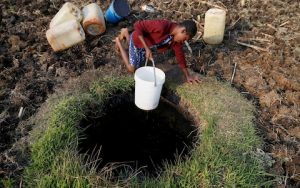
They know it is risky drinking untreated water from a borehole used by so many other people. “We have no option. This water is dangerous as you can see, just check,” says Kavalanjila, pointing to a pile of human waste nearby.
City authorities say they have had to shut down water supplies for 96 hours a week – more than half the time, often in two-day blocks – to cope with a sharp fall in reservoir levels caused by the country’s worst drought in years.
The shortages have exacerbated an economic crisis marked by shortages of foreign exchange, fuel, medicines and power that has triggered protests and political unrest.
Kavalanjila says the cut-offs often go on for longer than scheduled in his Luveve township.
He carries the well water home in buckets and containers then his wife Rumbidzai boils it before using it for bathing, flushing toilets and, sometimes, cooking.
“At times you see there will be little organisms in the water and even when you are bathing you feel your body itching,” Rumbidzai told Reuters in the local Ndebele language while her nine-year-old son had a bath to get ready for school.
“So if you boil the water it gets better.
DELAYED DAM
Bulawayo city has decommissioned two of its dams after water fell below pumping levels, according to the city’s director of engineering services Simelani Dube.
The remaining four dams have an average capacity of 35% and falling, he added. “We are projecting that in the next three to four weeks we might lose the third dam. It’s currently sitting above 10% in terms of capacity.”
Authorities say the long-term answer is for Bulawayo to build a new dam 100km (60 miles) away to draw water direct from the Zambezi River.
But the project, first mooted in 1912 by white colonists and finally started in 2004 is still is only a third complete.
Cassian Mugomezi, a sprightly 84-year old pensioner who has lived in the Luveve township for more than five decades, said the water cuts were some of the worst he could remember.
“If it does not rain this year I don’t know what we are going to do,” he said.
Like Kavalanjila, he has had to rely on open wells and other privately-run projects. A nearby church pumps out clean water through its own borehole. Today, though, it is shut down in one of the city’s regular power cuts that can last up for 18 hours.

